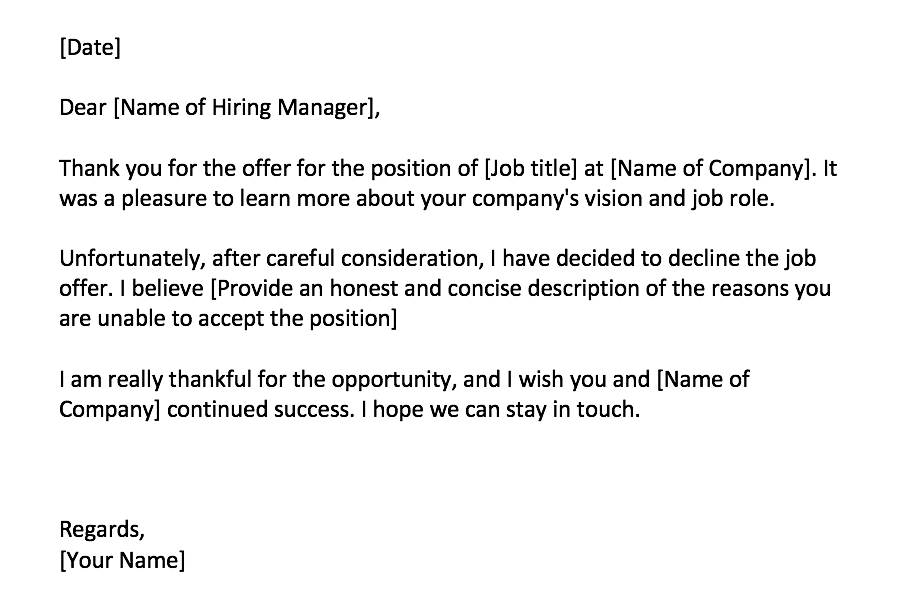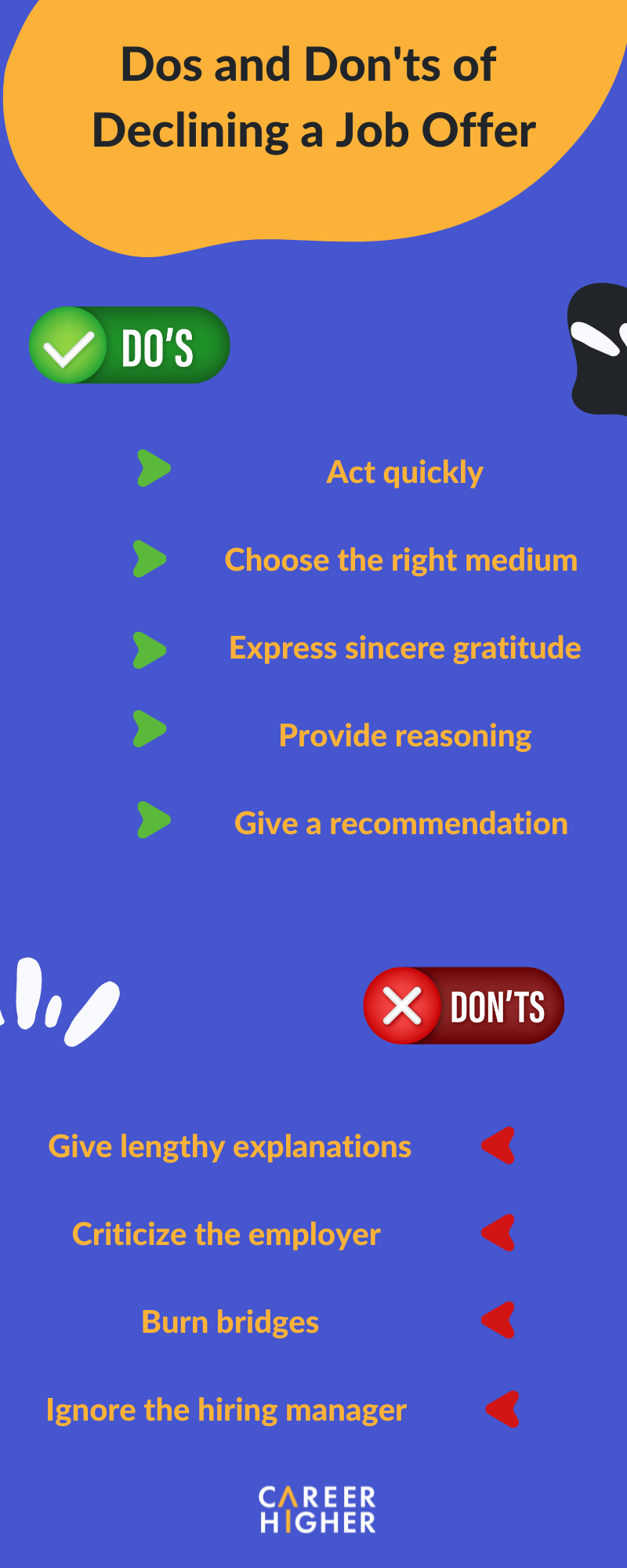Table of Contents
Turning down a job offer can be a difficult and awkward process. You may almost feel like you’re breaking a promise or not holding up your end of the deal. But is it wrong to turn down an offer? Absolutely not. In today’s candidate-driven job market, professionals may receive multiple job offers, and employers know their offers may be declined.
Once you have decided to decline a job offer, you should do so promptly, with professionalism and grace. It could help you be on good terms with the employer. This article discusses how to politely turn down a job offer and provides sample email examples.
How to write a job offer rejection email: a step-by-step guide
So you’ve decided to decline the offer but are unsure how to convey your decision? Here is a step-by-step process for writing a job offer rejection email:
1) Show appreciation
First and foremost, thank the hiring decision-maker for the job opportunity, their time, and for showcasing confidence in your abilities. Yes, interviewing you is a part of their job. Still, they have likely invested hours in your recruitment process, from analyzing your resume, reading your cover letter, conducting your interviews, to maybe even talking you up to others at their company. They are excited about you and hopeful that you’ll accept the position. So, heartfelt gratitude will go a long way in showing your appreciation.
2) State your decision
After expressing gratitude to the hiring manager, clearly state the fact that you’ve chosen to decline the job offer. It is best to not beat around the bush, and be truthful and transparent in your communication. Saying something like, “Unfortunately, I won’t be accepting the job position” is acceptable and recommended.
3) Explain your decision
After conveying your decision, it is important to provide its reasoning. It’s only proper and respectful to not keep the hiring decision-maker in the dark. However, do consider your reasons and the extent to which it is appropriate to explain them. For example, if you’re declining a job offer because you received a better offer from another company or the compensation was insufficient, you can be transparent and let the hiring manager know.
However, suppose you didn’t like the team, found the company reputation shady, or spotted any red flags in your potential boss. In such cases, it is best to refrain from disclosing negative criticism. While these are justifiable reasons for declining a job position, you don’t necessarily need to mention these, especially if you want to keep the networking gates open. Simply saying, “It is not the right match for my professional goals at this moment”, would suffice.
4) Offer to stay in touch
The professional world, especially in some industries, can be surprisingly small. Thus, it’s a good idea to offer to stay in touch, particularly if you have developed a good connection with the hiring manager. You could also consider connecting with them on LinkedIn.
In some situations, like when the position wasn’t the right fit, you could say you’d like to be considered for future roles that are more aligned with your goals. While the particular job position may not be ideal for you, you could mention your interest in exploring other professional collaborations with them.
Tips for turning down a job offer politely
In the above section, we have mentioned the key steps to cover in your email when declining a job offer. Now, we present a few simple tips to keep in mind when communicating your decision, especially if you’d like to be on good terms with the employer:
a) Respond promptly once you’ve made up your mind: It is a human tendency to procrastinate uncomfortable communications. But, in this case, time is of great value. Thus, when declining a job offer, we suggest communicating with the company as soon as you decide. This is considerate, as it enables the hiring manager to move forward with alternate candidates and close the opening soon.
b) Consider a phone call: If it feels appropriate to your situation, you could choose to break the news over a phone call instead of an email. While this may feel more stressful, it could be a more thoughtful choice and offer a greater personal touch. We recommend having a telephone conversation, especially if you have developed a good rapport with the hiring manager.
c) Keep it short and sweet: Be straightforward and concise in your communication. Don’t go overboard with lengthy justifications or excessive compliments. We suggest keeping it simple and polite and avoiding getting emotional.
d) Offer referrals: The job position might not be the right one for you, but you may know someone who would be a perfect fit. If this is the case, you may consider offering a referral to the hiring manager. Word-of-mouth referrals are among the most popular recruiting methods, and the hiring manager and the referee will both be thankful.
Email examples for declining a job offer
A well-written email is necessary to decline a job position with grace and professionalism. In case you’re struggling with writing one, looking at sample job rejection emails and templates can be helpful. Below, you can find some email examples for different situations:
Scenario 1: When you have accepted another job offer
Dear Grace,
Thank you so much for offering me the Marketing Analyst role at ABC Corp. I have enjoyed speaking to you over the last few days and sincerely appreciate your consideration.
However, unfortunately, I won’t be able to accept the job position. After much deliberation, I have decided to take the offer from another company that I believe is a better fit for my abilities and career aspirations.
I wish you the best of luck in finalizing the recruitment process successfully and hope we can stay in touch.
Best,
Kelly
Scenario 2: When the role isn’t the right fit for you
Hi Luke,
Thank you for offering me the opportunity to work as an Associate at XYZ Company. It has been a pleasure learning more about the job, organization, and company culture.
While I am grateful to receive such an incredible offer from you, I have come to a difficult decision. Unfortunately, I can’t accept the opportunity at this time. I am highly interested in XYZ Company, but the role itself doesn’t seem like a suitable match for my aspirations.
I hope to steer my career in the direction of writing rather than editing. I would love to be considered for a position in the future that better aligns with my interests.
I would love to stay in touch, and I wish you all the best.
Regards,
Priya
Scenario 3: When the salary doesn’t match your expectations
Hi John,
Thank you for taking the time to speak with me over the last few weeks and reviewing my counteroffer. I enjoyed meeting the team and learning about the exciting work you guys are doing at ABC Company.
While I am really grateful for the offer, I, unfortunately, have to decline the job at the current compensation. Being a startup, I understand that your budgets are also tight. If the pay for this role changes in the future, I’d love to be reconsidered.
I sincerely hope we have a chance to work together in the future. Let’s stay in touch.
Sincerely,
Robert
Scenario 4: When you want to decline a job offer after accepting it
Dear Ms. Chu,
Thank you so much for offering me the Marketing Analyst position at XYZ Cosmetics Co. I was thrilled to accept it, and it was my pleasure to meet you and the team last week.
Unfortunately, due to my personal circumstances, I will have to retract my acceptance. It has been difficult for me, as working at XYZ Cosmetics has been a long-term dream of mine. However, my father has become sick, so I must return to Asia to handle my family business. I plan on leaving the United Kingdom in the next few weeks. I apologize for any inconvenience my decision may cause.
I am grateful for your help and time and would love to stay in touch via LinkedIn. I hope you find the right candidate for the job soon.
Regards,
Rebecca
Job offer rejection template
Here is a generic letter template to decline a job offer, which you can modify as per your situation:
Download PDF Sample | Download Word Sample
No matter how sure you are, Declining a job offer never feels easy. It is a delicate task that should be carried out with professionalism and grace. Remember to communicate your decision promptly, express gratitude, and provide a brief yet specific reason. If done well, you could maintain a good relationship with the employer and move on to find the right job. If you are struggling to make the right career choices, feel free to reach out to us for help.













